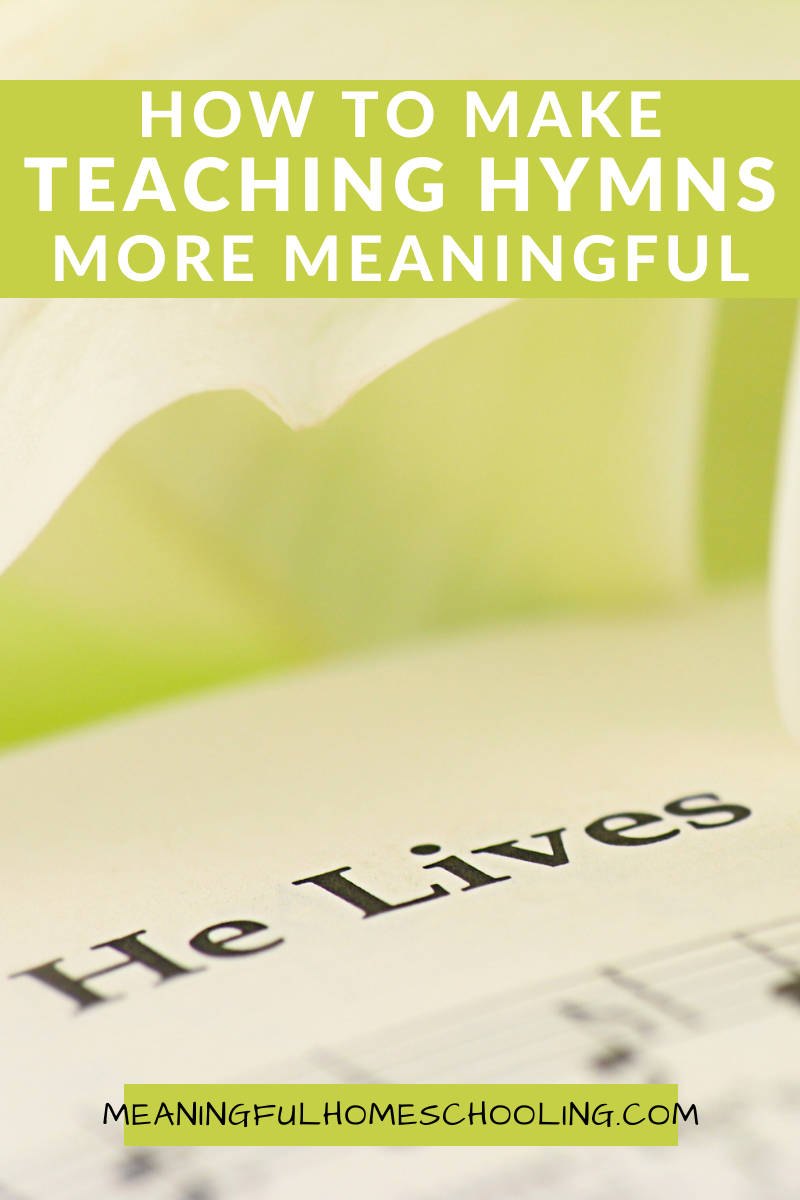How to Make Teaching Hymns More Meaningful
If you’ve spent any amount of time on my blog, then you know how much I love teaching hymns in my homeschool. I have the fondest memories of singing hymns in the little country church my father pastored when I was a little girl. Although most hymns have been replaced by modern praise music, I believe they still play an important role in our Christian walk. Below are my best tips to make teaching hymns more meaningful in your homeschool.

How to Make Teaching Hymns More Meaningful
Teach the history behind the hymn.
Oftentimes, certain things taught to kids don’t always click because they’re not able to make the connection to what they’re learning. Hymns certainly fall into this category because they’re considered “old fashioned.” Just about every hymn I’ve ever sang and studied has an author with an incredible testimony. Horatio Spafford, author of “It Is Well with My Soul,” is a perfect example of this. The words “when sorrows like sea billows roll” are a specific reference to the tragedy of losing his daughters in a shipwreck. Bring the hymns to life by sharing the historical meaning behind it.
Play the hymns often.
I don’t know about your household, but in mine we like to put on music while we clean, play, or to simply worship throughout the day. Creating a playlist of go-to hymns is the perfect way to expose your children to the powerful words, help them learn them, and get the meaning into their hearts. Not to mention, they will also get a music lesson in the process.
Related: 7 Classic Hymns Every Child Should Know
Relate hymns to Scripture.
If scripture study is already a part of your homeschool lesson plans, then adding in it’s connection to hymns will be super easy. If not, it still won’t be difficult to add that aspect. While hymns may not be directly quoted from scripture, they are often inspired by it. Consider breaking down a hymn and using a concordance to find scriptures that relate to it.

Resources to Make Teaching Hymns More Meaningful
I’ve created several hymn studies over the years that I believe will enhance your children’s understanding and deepen their love for God-honoring music. Below are a few I invite you to check out. Each of them have:
- hymn history
- lyrics
- sheet music
- links to listen to the hymn
- review questions to gauge comprehension
- vocabulary words taken from the hymn
- copywork and notebooking pages
- related Scripture to memorize
What a Friend We Have in Jesus
Written by Joseph M. Scriven, this song first started as a poem that would later become the classic song we’ve all grown to love so much. Ira D. Sankey discovered the hymn in 1875 and included it in his hymnbook, Sankey’s Gospel Hymns Number One. Since that time, “What a Friend We Have in Jesus” has become one of the best-loved hymns of all time.
The Old Rugged Cross
After a series of unfortunate events, George Bennard completed the words to this hymnal during a two-week revival meeting at the First Methodist Episcopal Church in Pokagon, Michigan. Strumming his guitar, he sang the song for the first time to the pastor and his wife.
Blessed Assurance
In spite of her blindness, author of Blessed Assurnace, Fanny Crosby wrote over 8,000 hymns and became one of the best known women in the United States at that time. She used over 200 pen names in her writing, and many of her hymn texts are still being discovered.
Amazing Grace
In 1767 Mr. Newton developed a friendship with the poet William Cowper. They began holding weekly prayer services and tried to write a new hymn for each one. “Amazing Grace”—a testimony of Newton’s marvelous transformation—is probably one of those hymns.

Final Thoughts
Hymns do not have to be songs of the past. In fact, teaching hymns to your children will have a lasting impact in their lives. The same memories we treasure so deeply will be the same ones our children will have when they are older. Imagine the legacy of singing hymns that will carry on simply because you taught them to your children. It is totally worth it!
